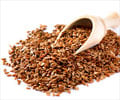Flaxseed, an edible seed that is rich in omega 3-fatty acids and fiber-related compounds known as lignans, is effective in halting prostate tumor growth.
A new study led by researchers at the Duke University Medical Center has found that Flaxseed, an edible seed that is rich in omega 3-fatty acids and fiber-related compounds known as lignans, is effective in halting prostate tumor growth.
The researches also think that the seed, which is similar to a sesame seed, may be able to interrupt the chain of events that leads cells to divide irregularly and become cancerous.The study, led by Wendy Demark-Wahnefried, Ph.D., a researcher in Duke's School of Nursing, was conducted on three groups of men made up of about 40 participants.
The multisite study, funded by the National Institutes of Health, also involved researchers at the University of Michigan and the University of North Carolina at Chapel Hill.
In the study, the researchers examined the effects of flaxseed supplementation on men who were scheduled to undergo prostatectomy -- surgery for the treatment of prostate cancer.
The men took 30 grams of flaxseed daily for an average of 30 days prior to surgery. Once the men's tumors were removed, the researchers looked at tumor cells under a microscope, and were able to determine how quickly the cancer cells had multiplied.
They compared men taking flaxseed, either alone or in conjunction with a low-fat diet, to men assigned to just a low-fat diet, as well as to men in a control group, who did not alter or supplement their daily diet.
Advertisement
Flaxseed is thought to play a part in halting the cellular activity that leads to cancer growth and spread. One reason could be that as a source of omega-3 fatty acids, flaxseed can alter how cancer cells lump together or cling to other body cells, both factors in how fast cancer cells proliferate, the researchers state.
Source: ANI
LIN/M

![Prostate Specific Antigen [PSA] Prostate Specific Antigen [PSA]](https://www.medindia.net/images/common/patientinfo/120_100/prostate-specific-antigen.jpg)








